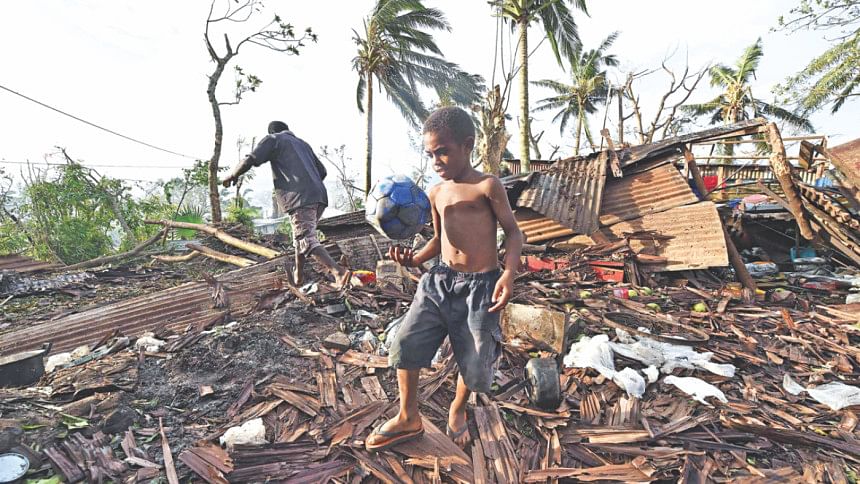'Islanders forced to drink saltwater'

People living on a remote island in the north-west of Vanuatu are having to drink harmful saltwater following last week's cyclone, the BBC has discovered.
Residents of Moso say they are still waiting for outside help to arrive.
Aid agencies have begun trying to access the country's small outer islands, but flooding has stopped their planes from landing in some areas.
One pilot said the lush landscape had been transformed and now looked as if it had been destroyed by a bush fire.
In addition to drinking water shortages, officials say there is also a desperate need for food and shelter, with tens of thousands of people now homeless.
Drinking saltwater is damaging as the more a person drinks, the more water already present in the body is rerouted to help dilute the excess of salt.
It can lead to dehydration and death.
The United Nations has revised the official number of people killed by the cyclone, bringing it down to 11 from an earlier figure of 24.
The relatively low number of casualties has been attributed to the advance warnings that were issued.
Four days after the cyclone struck, aid agencies say that outlying areas of Vanuatu hit by Cyclone Pam suffered "significantly worse" damage than the island nation's capital, Port Vila.
Local people and aid agencies say that the rebuilding effort will be immense. Getting aid to the islands has proven difficult because of a lack of landing strips or deepwater ports.
Teams carrying medical supplies, food, water and shelter equipment landed on the outer islands of Tanna and Erromango, agencies said.
The government is planning to set up a relay system known as "air bridges", where a large plane goes to a provincial capital, with lighter aircraft or boats being dispatched to surrounding islands.
Tom Perry from Care Australia said relief workers in Tanna reported the hospital was functioning but had no roof.
Similar damage was reported by Save the Children in Tongoa - a small island that has about 3,000 people - where 95% of homes are estimated to have been destroyed.
Communication to many of the other 80 islands in the archipelago is still down and officials have warned survivors could quickly run out of food.
The category five storm hit Vanuatu on Saturday, bringing wind gusts of up to 300km/h (185mph).
Many people have lost their homes or face extensive rebuilding. Telecommunications, power and water supplies have all been badly affected.
In Port Vila, power and water have been restored in some areas, with officials reporting good progress in the clear-up operation, despite up to 90% of homes being damaged.
One woman in Port Vila told the BBC that the scale of the destruction was immense - with curled up corrugated iron everywhere.
The president, returning from a conference in Japan, has described the storm as a "monster" linked to climate change, citing changing weather patterns, rising seas and heavier-than-average rain in Vanuatu.
Australia announced on Tuesday that it was sending more personnel, including a search and rescue team, and three more military planes carrying aid.

 For all latest news, follow The Daily Star's Google News channel.
For all latest news, follow The Daily Star's Google News channel. 



Comments